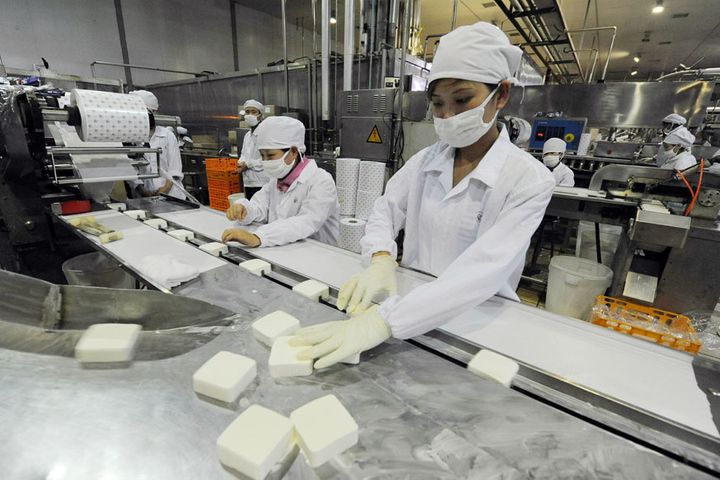 Time-Honored Brands Eye New Horizons on 70th Anniversary of Shanghai's Liberation
Time-Honored Brands Eye New Horizons on 70th Anniversary of Shanghai's Liberation(Yicai Global) May 27 -- Standing on the shores of the East China Sea, Shanghai has witnessed the vicissitudes of time since 1949. Rapid economic development drove commercial consumption and thereby created the city's shopping brands. In the new retail era, a batch of firms that have stood the test of the time, such as Bailian Group, Shanghai Hero Group, Shanghai Yimin No. 1 Foods Group and Jin Jiang International Holdings, are seeking new business opportunities through innovation even as they retain their traditional core products.
Shopping Center Resurgence
The term "shopping center" didn't exist in the Shanghai of the 1970s, when the city's urbanization was booming, while department stores were the main consumption venues. "Shopping at department store was a quite respectable thing for us in the past when general daily necessities were purchased in small shops," a 60-year-old male resident surnamed Chen told Yicai Global. Unlike today's shopping centers, department stores at the time lacked a variety in goods, with fewer personalized products available. Also, unlike shopping centers nowadays where an outlet sells goods from a specific brand, the department stores of yore sold goods ranging from clothes, food and cameras to clocks and watches.
Many well-known local brands, including Shanghai Yimin No. 1 Foods, emerged at that time. This Yicai Global reporter saw the earliest Bright Food logo, ice-cream machine and brand promotion vehicle at this food factory.
A more open environment ushered in Shanghai's commercial market soon after the city created a batch of well-known traditional brands. The State Council, China's cabinet, decided to develop Shanghai into an international economic, financial and trade center as soon as possible and launched the new leap for the whole Yangtze River Valley by opening up and developing Pudong at the start of the 1990s. With the deepening of China's reforms and opening up, the cabinet also announced 10 favorable policies for the development and opening up of Pudong. Allowing foreign businesses to pilot commercial retail ventures in Pudong New Area was the fifth such policy.
Kazuo Wada, founder of Japanese retail group Yaohan, paid a field visit to Pudong on April 12, 1991. One day later, the Shanghai First Commerce Bureau, Shanghai No. 1 Department Store, and Shanghai Pudong Commercial Construction Joint Development negotiated with Yaohan's delegation to set up a retail joint venture under the initiation of the Shanghai Municipal People's Government. Shanghai No. 1 Yaohan was founded after the two parties reached a consensus.
Shanghai No. 1 Yaohan Shopping Mall, one of the 10 symbolic buildings in Pudong, was equipped with 87 elevators inside and outside, with fire protection, security, air conditioning and lighting under centralized control of a master control room. Such facilities and size were rare at the time and once the best and the largest in Asia. In fact Shanghai No. 1 Yaohan was the prototype of the shopping center business to some extent.
Shanghai saw a rise in shopping centers over the following decade. The metropolis was expected to add about 3.3 million square meters of shopping space between 2014 and 2016, ranking first among worldwide major cities, real estate services and investment firm CBRE pointed out in an erstwhile research report titled: Shopping Centre Development — The Most Active Cities Globally.
Exploring New Business Opportunities
Shanghai has since developed a convenient shopping and consumption environment, clustered many global high-end brands and created well-known business circles.
Meanwhile, it also formulated a three-year plan to win initial success of the 'Shanghai Shopping' brand and accelerated the construction of an international consumer city. It has proposed creating a global consumption market and a hub for launching new global products to lead international consumption trends. The plan also suggests integrated development of business and various sectors such as commerce, exhibition, tourism, culture and sports.
Shanghai Disney Resort has been a tourist attraction since its completion. The Shanghai International Tourism and Resorts Zone, with Disneyland as its core, has received more than 51 million visitors in the three years since opening, equal to almost 50,000 each day. An upgraded Shanghai Lavender Park has been unveiled and the Shanghai Municipal Administration of Culture and Tourism has officially awarded the park a plaque that certifies it as an AAAA-level tourist attraction.
Shanghai's shopping environment has entered the era of new retail as people's shopping demands are increasingly diversified and they require more convenience with upgraded consumption. Both time-honored brands and innovative consumer brands are exploring new business avenues.
One such is the department store group Bailian, which is pushing ahead with internet-based transformation. The group is gradually bringing in various functions such as entering its stores with facial recognition and virtual shopping through artificial intelligence, Yicai Global found during a visit to Bailian's innovation experience center. One of these is a system that collects Big Data by appraising the customer journey and time spent on shopping. It has great significance for consumer behavior research, consumer positioning profiles and targeted marketing.
Three Gun, an underwear brand with a more than 80-year history, sold its first product four hours after it landed on eBay at the end of August 2017, with sales jumping for four straight weeks. The store successfully moved to eBay's top-rated sellers list in April 2018 after it logged an annual sales increase of 79 percent and 53 percent in March and April, respectively.
Shanghai's three-year plan of action suggests that by 2020, the level of application of innovative technologies will improve, the emergence of new forms of consumption and new business models will accelerate and emerging consumption will continue to expand. The city will also cultivate and gather a batch of leading companies in new retail, cross-border electronic commerce and logistics supply chain.